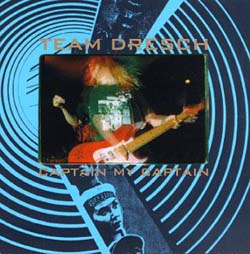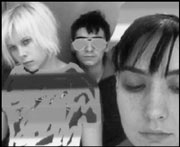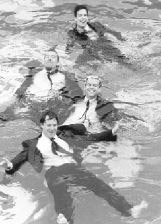“Basically, we’re a Team Dresch cover band,” cracks Melissa York. Speaking over the phone from her home in Durham, N.C., the former drummer for that pioneering dyke-punk band tells how they are preparing to play their first (and, for now, only) reunion at Olympia’s queer underground festival, Homo a GoGo. “We’re gonna have to learn our songs like a cover band would because they’re all new to us again. But we all kept playing music after we broke up, so at least it’s not like that VH1 show where they have these old bands reunite and the drummer hasn’t drummed in 20 years.”
Their return may not have the producers from Bands Reunited knocking down their door, but the legendary queercore act’s first show in six years has nonetheless inspired hundreds of fans to flock to Olympia from all over the country. Formed in Portland, Ore., in the fall of 1993, Team Dresch began as a veritable Who’s Who of underground Northwest rock: Bassist-guitarist Donna Dresch did time in Dinosaur Jr. and the Screaming Trees, guitarist-singer Jody Bleyle drummed in Hazel, guitarist-singer Kaia Wilson fronted Adickdid, and first full-time drummer Marci Martinez played in Calamity Jane. “We all had a real admiration for each other as musicians,” says Wilson. “But clearly, we were intensely connected to each other as freaky dykes. It was, like, ‘Wow, look, you’re kind of like me.'”
They weren’t the only ones. In the early ’90s, as riot grrrl brought feminism to the rock underground, bands like Pansy Division and Tribe 8 were helping usher in a new era of out punk. But while the former approached gayness primarily with levity and the latter used in-your-face aggression, Team Dresch best captured queer life’s complexities with a fiery-but-fragile melodic fury, and Wilson and Bleyle’s frank, unpretentious lyricism resonated with gay and lesbian rock fans who’d longed to hear their reality articulated so openly. Punk has a long history of closeted or discreetly queer musicians (the Buzzcocks, Hüsker Dü), but no prior punk band had so explicitly tackled the confusion, anger, contradictions, oppression, and joyous self-discovery that come with growing up gay.
“I hear all the things they say about me/And I wonder how they know all these things I don’t know about me,” Wilson sang on “The Council,” voicing the frustration and fear that come with being labeled before you’re even sure of your own identity. Bleyle sang of suicidal thoughts, depression, and the conditional love often offered by queers’ parents (“She only loves me when I act just like she does/And that’s emotional blackmail”). Team Dresch explored often painful topics that, as shared experiences, bond those within a minority. “Sometimes I can’t remember why I want to live,” Bleyle sang on “Musical Fanzine.” “Then I think of all the freaks, and I don’t want to miss this.”
Team Dresch and queercore’s popularity quickly spread, and attention from the music press grew. While the coverage got the word out to people who needed it most—this writer, for instance, was stuck in rural Michigan as a teen and learned about them through Spin—it also helped fuel a homophobic backlash against queers claiming their rightful space in an underground rock scene that, following the Northwest’s grunge explosion, increasingly reeked of white, upper-middle-class male privilege. (“Do-it-yourself means do it for me/I don’t give a shit, just get my video on MTV,” Bleyle mocked on “To the Enemies of Political Rock.”) Unsurprisingly, many guys felt threatened, and some began showing up at Team Dresch shows to cause trouble.
“At one show, in the parking lot of the Pine Street Theater in Portland, some guy started calling me a dyke, and he punched me,” says Bleyle. “Then Donna jumped on him and he punched her a bunch of times. I ended up getting stitches. There were definitely lots of different places where guys were resistant.”
“There always were people who wanted to tell us that we were being exclusive, alienating straight audiences, that we were too this, too that, like the whole ‘Why do you gotta talk about it?’ thing,” says Wilson. “But the positives always outweighed the negatives. At the very least, we felt embraced by the people we needed to feel embraced by.”
In late 1994, after a volatile East Coast tour supporting their Chainsaw/Candyass debut, Personal Best, Martinez departed. “It was all really overwhelming for me, and I was like, ‘Sorry, I’m freaking out,'” she says. Then, shortly after York joined and the band recorded its second and final album, Captain My Captain, Wilson also left. Team Dresch continued intermittently, with a string of second guitarists and Martinez back on drums, ultimately calling it quits in 1998. “Deep down inside,” says Martinez, “I think we all felt weird still doing it [without Wilson].”
While everyone continued playing in various other projects—Wilson and York in the Butchies, Bleyle in the Infinite X’s and Hazel, Martinez in the Vegas Beat and, most recently, Dresch in Davies vs. Dresch—they wouldn’t all cross paths again until fall 2001. “We ran into each other at [Seattle gay rock festival] Bent and just all had a hug fest,” says Bleyle. “We just started talking casually about a reunion, and Homo a GoGo was the obvious place to play.”
Given that their legacy has only grown since their breakup—due partly to the band’s limited lifespan and partly because few similarly successful, proudly queer-identified acts have emerged in their wake—when Team Dresch (including both Martinez and York on drums) take the stage this week, it’ll be the first time many fans will have the opportunity to see them perform. “I think a lot of people are gonna come just for that reason,” says York, “even if this Team Dresch is a little older version. We’ve been joking about coming out in wheelchairs and walkers.”
“I’m gonna get some Botox and do some things to make myself look younger and better,” adds Wilson, laughing. “But we’ve all progressed in some level of musicianship. I don’t wanna jinx us, but in some ways we could have a better show than we did before.”
Team Dresch play the Capitol Theater, 206 E. Fifth Ave., Olympia, 360-754-5378, at 6 p.m. Sat., Aug. 7. $15.






